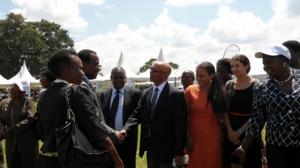Uganda commemorates World Breast Feeding Week 2013
Kampala August 2013 -- Uganda commemorated the World Breast Feeding Week (WBW) 2013 with a call to mothers to exclusively breastfeed their children for the first six months after birth irrespective of their HIV status.
The call was made by the Minister of State for Health (General Duties) Dr Elioda Tumwesigye during the national commemoration of WBW under the theme: “Strengthening Community Support for Optimal Breastfeeding towards a Healthy well Nourished and HIV Free Generation” held in Namutumba district. The theme intends to emphasize the need to provide support to the breastfeeding mothers to optimally breastfeed their children.
In his remarks Dr Tumwesigye said “for so many years, HIV infected women have been refrained from breastfeeding or often shortened their usual duration of breastfeeding due to fear of post-natal transmission of HIV to their babies through breast milk. This has often led to malnutrition and deaths among infants which would have been avoided through breastfeeding.”
WHO recommends exclusive breastfeeding for all women regardless of her HIV status for the first 6 months after birth. However, if the mother is HIV positive, she should be on ARV treatment for the entire duration of breastfeeding period or life as per the Elimination of Mother to Child Transmission of HIV (eMTCT) policy guidelines to reduce the risk of transmission and ensure the survival of the child.
In his statement, the WHO Country Representative Dr Wondimagenehu Alemu urged national authorities to scale up and sustain coverage of the proven cost-effective package of interventions to significantly reduce child mortality. “This package”, he said, “includes promotion of exclusive breast feeding; hand washing; immunization and appropriate treatment of malaria, pneumonia and diarrhea at facility and community levels.”
Dr Alemu pointed out that breastfeeding confers short and long-term benefits on both child and mother, including protecting children against a number of diseases adding that infants who are not breastfed are 6 to 10 times more likely to die in the first months of life than those who are breastfed.
Dr Alemu reminded health professionals to change from “nutrient-based approach” to “food-based approach” when communicating to the general public as “people eat and enjoy food and not nutrients”.
Dr Alemu also announced that WHO with funding from Canadian International Development Agency (CIDA) will support the Ministry of Health to demonstrate improvement of complementary feeding for children below 2 years using indigenous foods in selected districts including Namutumba.
“In the next few days my technical staff and their counterparts from the Ministry of Health will be coming back to discuss with the district leaders the details of this project”, he said. The other five districts where the initiative will be implemented are Jinja, Tororo, Kisoro, Ntungamo and Manafwa districts.
The WBW was used to strengthen the collaboration of stakeholders at all levels through advocacy and active engagement.
The activities implemented included a policy dialogue with members of parliament, a symposium for the students, a community nutrition camp, and mass media programmes.
_________________________________________________________________
For more information please contact :
Benjamin Sensasi, Health Promotion Advisor, WHO Country Office
Tel 256-414-335500
Email: sensasib [at] ug.afro.who.int (sensasib[at]ug[dot]afro[dot]who[dot]int)





